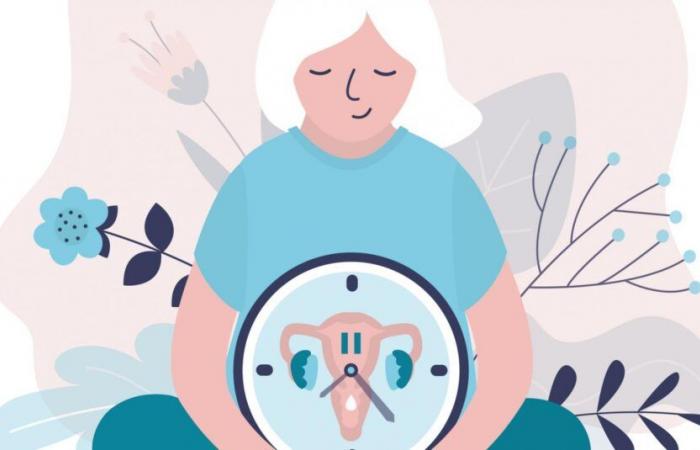Finally discussed head-on, menopause was on everyone’s lips this year. Beyond prejudices – older, more desirable – some women have taken to the Web to tell their story. Focus on three initiatives. By Julie Nicosia.
A real reversal of the situation has taken place for menopause in 2024. This subject, which until recently still seemed taboo, has seen renewed interest from all sides. Medical publications have multiplied, as have advances in treatments, specially dedicated cookbooks, workshops and apps, and above all, more and more women concerned have started to talk about it more freely, in a manner uninhibited.
As a reminder, the definition of this pivotal period, according to Serge Rozenberg, head of the menopause clinic at CHU Saint-Pierre: a menopausal woman is “a patient aged 50 and over who has not had menstruation for at least 6 months , ideally 1 year. However, it doesn’t work for everyone in the same way. It is possible that before the age of 40, some people experience early menopause. Doctor Rozenberg then warns: “We know that having an early menopause (from the age of 45) has consequences on aging, such as risks of osteoporosis (deterioration of bone density) or coronary heart disease ( heart attack). It is in these cases that taking hormones is strongly recommended at least until normal menopause, at age 50.”
Alongside these risks, symptoms can appear such as hot flashes, vaginal dryness, itching, mental fog, etc. How to deal with this change which can be experienced as a shock for some? Maïtena Biraben – with Alexandra Crucq –, Sophie Kune and Claire Fournier are all women and menopausal and have decided to make their voices heard and those of people who have also gone through this stage. Their approach? Intimate stories that sound like an ode to life.
Hot inside, Claire Fournier’s podcast
Claire Fournier is an economics journalist for the French channel LCI and, at 47, she decided to launch her intimate podcast Chaud dans, named in reference to the hot flashes felt by certain women during menopause. She created this 22-episode podcast after the announcement of her peri-menopause and as a result of the lack of resources available on the subject: “As I could not find the information I needed or it was particularly anxiety-inducing (loss of libido, loss of memory, loss of hair, sleeping problems, etc.), I decided to collect as much data as possible and make it available to other women who, probably like me, have found themselves in a great loneliness when they were told about their menopause,” she confides. She also has an Instagram account with a community of 4,274 followers, “to be able to interact with her listeners”.
The challenge for Claire Fournier is to “raise the taboo of menopause considered as an immodest subject in conversations between friends or at work for its unsavory nature”. What bothers society the most for the podcaster is talking about the female body and aging: “We are in a society obsessed with youthism and therefore a woman who is no longer able to procreate, she loses “its usefulness”. That’s what I’m trying to deconstruct!”
And added: “I also wanted to tell all these women that they still have value and a fundamental role to play.” Like Maïtena Biraben and Sophie Kune (read elsewhere), what these women who decided to take this theme head on were missing was a narrative, a story of menopausal women: “The women of 45 at 65 are completely invisible. Between being a mother and being a grandmother, there is a kind of shifting zone where the narrative has not been invented.”
This is therefore what she achieves with Chaud dans dans where she “tries to pull the threads of the multiple facets of this period of life, whether physiological, psychological or societal” with episodes on sexuality, on how to age. with friends or even on mental fog.
Mesdames.media was created online on May 22 by two well-known French television personalities: Maïtena Biraben and Alexandra Crucq. This young media was born from an observation: “People say anything about us. The story we have about women over 45 is completely disconnected from reality. We know this because we tell the truth, but what society says about us makes no sense,” explains Maïtena Biraben.
For this tandem, “the narrative carried by society constrains and assigns with discourses according to which you spend your time hearing that you are leaving life, you no longer have desire, you are no longer desirable, you are no longer desirable. are no longer of any use, you are ugly, you are old and you are tidy. It hits the system for us!”
Moreover, in the book La Femme invisble which she published this year, the French presenter looks back on her entry into her fifties. Amazed “forever” by the way “we talk about women, little girls, young girls, young women and women who are no longer young”, she explains that she moves forward in life by asking herself questions which correspond to her age and that she confronts the problems linked to her age “when she gets there”.
According to her, “around the age of 45-50, I understood that there was something like adolescence that came back, where I was told how I should dress, what I should no longer wear and how I should behave.” This way that society tells her how to behave shocks Maïtena Biraben who has a “fierce hatred for assignment.” But the author maintains that the story is not only negative and that there is ultimately no reason for the positive to disappear, insisting on the fact that “it’s an age where we know ourselves very well, it “is much more pleasant, where we are in the world much more easily, where relationships with others are much more pleasant.”
Share authentic stories
The niche of this new media is therefore to break away from the dictates of beauty and fertility and to tell authentic stories, such as that of this woman who became a hairdresser at 57, of this other who became a lumberjack or even of the one who started to gospel. Stories that are also told thanks to the “freedom of this age”, continues Maïtena Biraben: “These are not just grandiose and moving testimonies. These are very small things sometimes, but they tell the story of the autonomy that we regain over our lives at that moment, finally. Because it’s an age where we did what we had to do: we made our careers, our children or not, our marriages (successful or not). We can finally be ourselves, it’s the first time. It’s extraordinary!”
Alongside these life stories, mesdames.media takes into account what hormones cause on the body: “We know what happens during menopause. On the other hand, they don’t tell us, even though it’s quite simple: we are managed all our lives by hormones, with changes within us that are very powerful. When we know that a lot of things depend on them, we can study the problems we have in our body by associating them with drops in hormones. For example, by compensating for this drop in hormones with an appropriate diet. This is what we do in the cooking recipes offered with Agnès Leclerc-Bernain, naturopath.” And to clarify that it is not a panacea but it works on some women.
This media dedicated to women over 45 shakes up the codes with a website and a significant presence on social networks (YouTube, Facebook, TikTok – with 194,600 followers and Instagram with 270,000 followers). This hyperactive community in the French-speaking world is one of the strengths of the media which aims to echo the reality of nearly one in two women in Belgium and France: “Menopause is an event in life and it brings its lot of surprises, joys, possibilities. And we must not miss it because the story that we are given about ourselves is not our reality and we only have one life,” concludes Maïtena Biraben.
Menopause.stories, Sophie Kune’s Instagram account
Sophie Kune was put into artificial menopause eight years ago. At that time, she was not prepared for the consequences it had on her life. During her research, she did not find an echo: “There are no contemporary words from women who talk about what is happening and what we can feel.” She then grabs her pen and begins to write several notebooks. It was with all these things she had to say that she decided to create an Instagram account in 2019. “It was easy to launch an account without spending anything,” she explains. It allowed me to have an almost conversational tone, using GIFs and emojis. I wanted to have a laugh, offer contemporary content, from today.”
Content creation has become the main activity of the person who defines herself as Chief Menopause Officer: “Because I don’t have much time to do anything else. I became ‘expert’. I started speaking at conferences, I brought the voice of menopause to the airwaves through a podcast, I co-founded a treatment.”
Evoking new references while deciding to talk about the symptoms of menopause has become the mantra of this woman who claims to talk about both the negative effects (mental fog, hot flashes, vaginal dryness) and the positive effects (50 years is a age of self-acceptance where we don’t stop living as a woman…) of menopause: “We need to dust off this stage to be able to break down the wall for us (women) to be able to continue to be.” Sophie Kune’s approach follows three steps that she considers essential: awareness, information and support. The author of Game is not Ovaire (Marabout, 2023) recalls the title of her work: “At 50, even 55, we are still here. We are at our maximum. Now is not the time to close the Game!”






